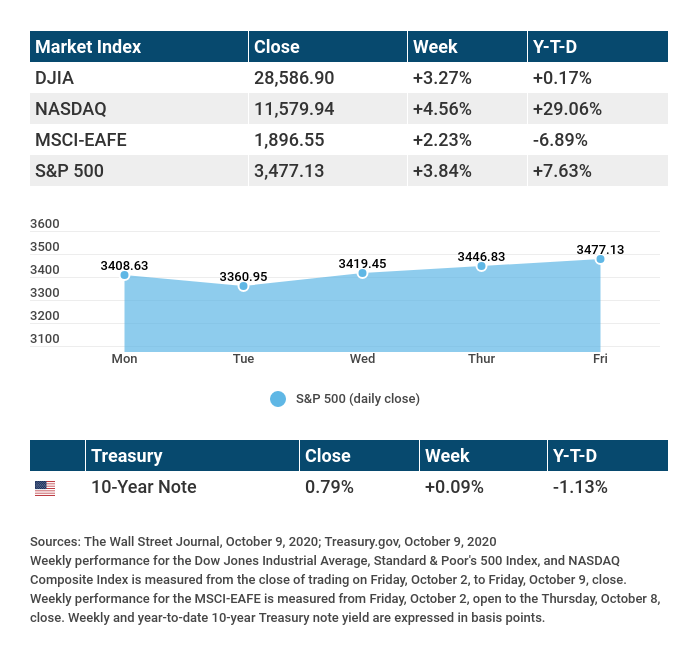
Stocks staged a powerful rally last week, riding a wave of optimism over the prospect of the passage of a new fiscal stimulus bill.
The Dow Jones Industrial Average rose 3.27%, while the Standard & Poor’s 500 increased 3.84%. The Nasdaq Composite index gained 4.56% for the week. The MSCI EAFE index, which tracks developed overseas stock markets, advanced 2.23%.[1],[2],[3]
Stimulus Stalemate?
The anticipation of lawmakers passing a new round of economic stimulus was a decisive driver of market action all week.
A mid-week tweet by President Trump announcing that he was ending stimulus negotiations sent stocks lower. Losses were exacerbated by sharp declines in some mega-cap technology companies as details emerged from a House Judiciary subcommittee report on its investigation into their competitive practices.[4]
Stocks quickly reversed direction, climbing after the President tweeted that he would sign a limited stimulus bill, but lawmakers appeared to reject a piecemeal approach.
Stocks consolidated on Friday, helped by continuing stimulus talks and new election polls that suggested that the risk of a contested outcome appeared to be fading.
Small Cap Rally
The outperformance of large cap stocks relative to small cap stocks has been both wide and persistent during the last ten years. Last week’s action in small cap stocks, as represented by the Russell 2000 Index, indicates that smaller companies may finally be making up some ground.[5]
Last week, the Russell 2000 Index rose 6.33%, outperforming the S&P 500 by 2.4%.[6]
While this outperformance may be fleeting, a potential broadening of the stock market rally may be considered a healthy development.
Final Thoughts
This week begins the third-quarter earnings season, with companies from a variety of industry sectors reporting (see below). Early earnings reports start predominantly with the major banks, whose earnings results may provide insight into the general health of American consumers.
As is often the case, company guidance about the future earnings may be of greater interest to investors than past results.
Robert Roman
CEO, Managing Director
THIS WEEK: KEY ECONOMIC DATA
Tuesday: Consumer Price Index (CPI).
Thursday: Jobless Claims.
Friday: Industrial Production. Consumer Sentiment.
Source: Econoday, October 9, 2020
The Econoday economic calendar lists upcoming U.S. economic data releases (including key economic indicators), Federal Reserve policy meetings, and speaking engagements of Federal Reserve officials. The content is developed from sources believed to be providing accurate information. The forecasts or forward-looking statements are based on assumptions and may not materialize. The forecasts also are subject to revision.
THIS WEEK: COMPANIES REPORTING EARNINGS
Tuesday: Johnson & Johnson (JNJ), J.P. Morgan Chase (JPM), Citigroup (C), Blackrock (BLK)
Wednesday: Bank of America (BAC), UnitedHealth Group (UNH)
Thursday: Morgan Stanley (MS)
Friday: Schlumberger (SLB), J.B. Hunt Transport Services (JBHT), Kansas City Southern (KSU), V.F. Corporation (VFC)
Source: Zacks, October 9, 2020
Companies mentioned are for informational purposes only. It should not be considered a solicitation for the purchase or sale of the securities. Investing involves risks, and investment decisions should be based on your own goals, time horizon, and tolerance for risk. The return and principal value of investments will fluctuate as market conditions change. When sold, investments may be worth more or less than their original cost. Companies may reschedule when they report earnings without notice.


“A reader lives a thousand lives before they die. The person who never reads only lives one.”
– George R.R. Martin

You Have the Right to Confidentiality
According to the Taxpayer Bill of Rights, the IRS won’t share any information that a taxpayer gives with outside parties unless allowed by the taxpayer themselves or the law. This right to confidentiality is one of the 10 rights found in the Taxpayer Bill of Rights.
Also included in the confidentiality clause:
- The IRS can’t contact third parties, including employers, friends, or banks, for information without giving the taxpayer reasonable notice first.
- The same confidentiality you have with an attorney also applies to tax professionals working with the IRS on your behalf.
Confidential communications include conversations, messages, and documents that are considered private or restricted between a taxpayer and their attorney or the IRS.
* This information is not intended to be a substitute for specific individualized tax advice. We suggest that you discuss your specific tax issues with a qualified tax professional.
Tip adapted from IRS.gov [8]

Try the Mirror Drill
If you find yourself digging into the ground with your club face on impact, chances are that you’re using the leading edge of the club and turning it into the ground. This means you’re not getting as much loft as you should, which can sabotage your short game.
To fix this problem, try the mirror drill. As you set up for your shot, turn your club so the grooves face up and imagine that there’s a mirror there. Throughout your swing, the “mirror” should always face up so you would be able to see yourself in it. This also includes during your back swing. The grooves (or “mirror”) should point straight back at you.
Practice this motion of keeping the club face open until it becomes natural, then follow through with your swing while keeping your “mirror” facing up. This will help you make better contact with the ball and improve your strike.
Tip adapted from PGA of Australia [9]

Get Lost in a Book for National Book Month
Did you know that October is National Book Month? There’s no better time to get lost in a great story because not only is reading entertaining, but there may also be some health benefits to getting lost in a good book, as well.
Here are some potential health benefits of reading:
- Reading may bring existing neural pathways in the brain to life and help the brain remain elastic and active.
- Reading may decrease mental decline, especially for older adults.
- Reading may improve short-term memory and recall capabilities.
- Reading may reduce stress and depression
- Reading may help you fall asleep when used as a bedtime ritual. But, this only applies to reading real books, not e-readers or tablets.
Reading may have health benefits for people of all ages, from children to older adults!
Tip adapted from Business Insider [10]

Swap Out These Three Items for a Greener Kitchen
You don’t have to go entirely waste-free to make some beneficial and eco-friendly changes in your kitchen. Just a few substitutions can go a long way towards making your kitchen healthier for you and the environment.
Here are three items you can easily swap out to help make your kitchen greener:
- Replace single-use plastic containers with glass. Single-use plastic can be found everywhere in your kitchen, from your dish soap to foods in your pantry and fridge. Replace pasta sauce and drink containers with glass instead. Glass containers can be reused in your kitchen afterward or recycled.
- Turn old t-shirts into cleaning towels. Don’t throw your old t-shirts away, but give them a second life as cleaning towels. Use them to help keep your kitchen clean without using disposable sponges or paper towels.
- Use what you have until it wears out. Rather than replacing all your existing plastic containers and water bottles with glass or eco-friendly options, use what you have until it wears out. Then feel free to replace them with more environmentally friendly options.
Get creative! What else can you do in your kitchen to make it more environmentally friendly?
Tips adapted from MyModernMet.com[11]
Investing involves risk including the potential loss of principal. No investment strategy can guarantee a profit or protect against loss in periods of declining values.
Diversification does not guarantee profit nor is it guaranteed to protect assets.
International investing involves special risks such as currency fluctuation and political instability and may not be suitable for all investors.
The Standard & Poor’s 500 (S&P 500) is an unmanaged group of securities considered to be representative of the stock market in general.
The Dow Jones Industrial Average is a price-weighted average of 30 significant stocks traded on the New York Stock Exchange and the NASDAQ. The DJIA was invented by Charles Dow back in 1896.
The Nasdaq Composite is an index of the common stocks and similar securities listed on the NASDAQ stock market and is considered a broad indicator of the performance of stocks of technology companies and growth companies.
The MSCI EAFE Index was created by Morgan Stanley Capital International (MSCI) that serves as a benchmark of the performance in major international equity markets as represented by 21 major MSCI indices from Europe, Australia, and Southeast Asia.
The 10-year Treasury Note represents debt owed by the United States Treasury to the public. Since the U.S. Government is seen as a risk-free borrower, investors use the 10-year Treasury Note as a benchmark for the long-term bond market.
Opinions expressed are subject to change without notice and are not intended as investment advice or to predict future performance.
Past performance does not guarantee future results.
You cannot invest directly in an index.
Consult your financial professional before making any investment decision.
Fixed income investments are subject to various risks including changes in interest rates, credit quality, inflation risk, market valuations, prepayments, corporate events, tax ramifications and other factors.
These are the views of Platinum Advisor Strategies, LLC, and not necessarily those of the named representative,
Broker dealer or Investment Advisor and should not be construed as investment advice. Neither the named representative nor the named Broker dealer or Investment Advisor gives tax or legal advice. All information is believed to be from reliable sources; however, we make no representation as to its completeness or accuracy. Please consult your financial professional for further information.
The market indexes discussed are unmanaged and generally considered representative of their respective markets. Individuals cannot directly invest in unmanaged indexes. Past performance does not guarantee future results. The return and principal value of investments will fluctuate as market conditions change. When sold, investments may be worth more or less than their original cost.
[1] The Wall Street Journal, October 9, 2020
[2] The Wall Street Journal, October 9, 2020
[3] The Wall Street Journal, October 9, 2020
[4] CNBC.com, October 6, 2020
[5] The Wall Street Journal, October 8, 2020
[6] The Wall Street Journal, October 9, 2020
[7] Allrecipes.com, October 9, 2020
[8] IRS.gov, October 9, 2020
[9] YouTube.com, October 9, 2020
[10] BusinessInsider.com, October 9, 2020
[11] MyModernMet.com, October 9, 2020

